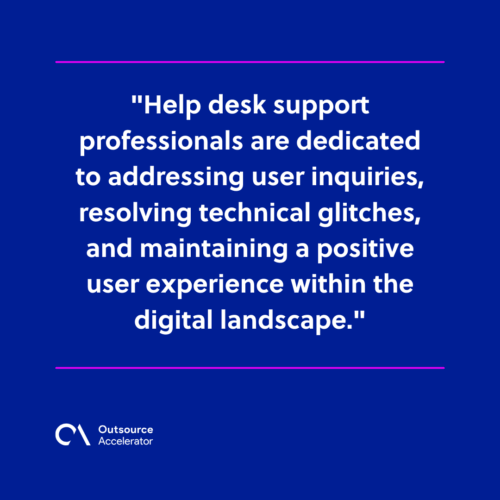Help desk vs. Desktop support: Differences explained

In the field of Information Technology (IT), every click and keystroke matters.
Choosing between help desk and desktop support can be a challenging task. Understanding the differences between the two is crucial to ensure seamless operations.
This article breaks down the differences between help desk and desktop support to help you make an informed decision for your company.
What is help desk support?
Help desk support is a vital component of an organization’s IT infrastructure. It serves as the first line of assistance for users encountering technical issues.
Professionals in this role are dedicated to addressing user inquiries, resolving technical glitches, and maintaining a positive user experience within the digital landscape.

Responsibilities of a help desk support
Here are five specific responsibilities of a help desk support role:
User assistance
User assistance is at the forefront of help desk support responsibilities. Trained experts in this role guides users who encounter technical challenges.
Whether it’s a simple query or a complex issue, they make sure users feel supported and their concerns are addressed promptly.
Issue resolution
Effective problem-solving is a key aspect of help desk support. Solving technical issues is vital for minimizing downtime for a smooth user experience.
Help desk professionals employ their expertise to diagnose and address problems quickly.
Ticket management
A systematic ticketing system facilitates the organized handling of user requests.
A help desk support prioritizes tickets for a structured approach to resolving user issues. This role ensures that tasks are managed efficiently and no concern falls through the cracks.
Communication
Clear and concise communication is a fundamental skill of a help desk support.
Experts bridge the gap between technical language and user-friendly explanations. They communicate solutions and instructions in a manner that is easily understandable to clients.
This responsibility fosters a positive and collaborative support experience.
Knowledge base maintenance
Maintaining a comprehensive knowledge base is an ongoing responsibility of a help desk support. This central storage is useful for both the support team and users.
Frequent updates to the knowledge base allows help desk teams to quickly solve issues with the latest information.
Skills to look for in a help desk support
Several key skills contribute to the effectiveness of the support team when considering candidates for help desk support roles.
Here are essential qualifications to look for:
- Technical proficiency. This includes a strong understanding of various software applications, operating systems, and IT infrastructure.
- Customer service skills. Exceptional interpersonal skills, patience, and clear communication for positive user interactions are vital.
- Problem-solving abilities. A helpdesk support agent must possess Analytical skills to identify and resolve technical issues efficiently.
- Team collaboration. It pertains to the ability to work seamlessly with colleagues, support teams, and IT professionals.
- Organization and time management. This covers excellent prioritization skills to manage multiple tasks and user requests effectively.
What is desktop support?
Desktop support is a specialized IT role focused on the smooth functioning of individual computer systems within an organization.
This role addresses both hardware and software aspects. It aims to provide clients with an uninterrupted experience.

Responsibilities of a desktop support
Here are common responsibilities associated with a desktop support role:
Hardware and software troubleshooting
Desktop support professionals excel in identifying and resolving both hardware and software issues. Whether it’s a malfunctioning device or a software glitch, troubleshooting is their expertise.
Installation and configuration
Desktop support agents ensures the proper installation and configuration of hardware and software. From new systems to software applications, they make sure everything is set up for optimal performance.
User support
Similar to help desk support, desktop support professionals provide direct assistance to individual users. They fix issues for individual users, making sure everyone can use their desktops smoothly.
Preventive maintenance
Desktop support doesn’t just fix issues when they arise.
Experts in this field include proactive maintenance to spot and resolve potential problems. They safeguard the overall reliability of desktop systems.
Hardware upgrades and repairs
When it’s time for an upgrade or a fix, desktop support takes charge. Desktop support manages hardware upgrades to keep systems updated and conduct repairs when devices encounter issues.
Skills to look for in a desktop support
When hiring for a desktop support position, it’s important to look for candidates with a combination of technical and interpersonal skills.
Here are five key skills to consider:
- Technical proficiency. A reliable candidate muste have a strong understanding of hardware and software components, with the ability to troubleshoot technical issues effectively.
- Customer service skills. Excellent interpersonal skills for providing user support and ensuring a positive experience is required in this role.
- Problem-solving abilities. Desktop support experts possess analytical skills to diagnose and resolve desktop-related issues efficiently.
- User support. This includes the capability to assist individual users with desktop-specific challenges and provide effective solutions.
- Organizational and time management. It pertains to prioritization skills to manage tasks, including preventive maintenance, hardware upgrades, and repairs, efficiently
Help desk vs. Desktop support: Similarities and differences
Below are some similarities and differences between help desk and desktop support:
Scope
Both help desk and desktop support aim to assist, but their scopes differ. A help desk expert covers a broader range of user issues, while desktop support is more device-specific.

Level of complexity
A help desk role encounters diverse challenges, ranging from software glitches to network issues. Desktop support, on the other hand, deals specifically with hardware and software complexities at the device level.
Location of support
Help desk support often provides remote assistance, resolving issues without physical presence. Desktop support may require on-site assistance, especially when dealing with hardware-related problems.
Help desk vs. Desktop support: Which support system should you use?
When choosing between help desk and desktop support, consider the nature of your company’s IT needs.
If you require comprehensive user assistance across various issues, help desk support is the answer. For a focus on device-specific challenges and preventive maintenance, desktop support might be the better fit.







 Independent
Independent




